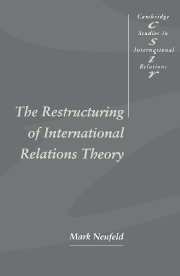Book contents
- Frontmatter
- Contents
- Acknowledgments
- Introduction
- 1 International Relations theory and the Aristotelian project
- 2 Defining positivism
- 3 Reflexivity and International Relations theory
- 4 Human consciousness and International Relations theory
- 5 International Relations theory and social criticism
- 6 Conclusion
- Notes
- Bibliography
- Index
- CAMBRIDGE STUDIES IN INTERNATIONAL RELATIONS
4 - Human consciousness and International Relations theory
Published online by Cambridge University Press: 15 December 2009
- Frontmatter
- Contents
- Acknowledgments
- Introduction
- 1 International Relations theory and the Aristotelian project
- 2 Defining positivism
- 3 Reflexivity and International Relations theory
- 4 Human consciousness and International Relations theory
- 5 International Relations theory and social criticism
- 6 Conclusion
- Notes
- Bibliography
- Index
- CAMBRIDGE STUDIES IN INTERNATIONAL RELATIONS
Summary
The observer … is able, by virtue of his own rationality, to retrace the steps which politics has taken in the past and to anticipate those it will take in the future. Knowing that behind these steps there is a rational mind like his own, the observer can put himself into the place of the statesman — past, present, or future — and think as he has thought or is likely to think.
Hans J. MorgenthauBut in the night of thick darkness enveloping the earliest antiquity, so remote from ourselves, there shines the eternal and never failing light of a truth beyond all question: that the world of civil society has certainly been made by men, and that its principles are therefore to be found within the modifications of our own human mind. Whoever reflects on this cannot but marvel that the philosophers … should have neglected the study of the world of nations, or civil world, which, since men had made it, men could come to know.
Giambattista VicoIntroduction
The rise of theoretical reflexivity at the margins of the discipline is not the only evidence for a restructuring of International Relations theory. In this chapter, it will be argued that a second defining characteristic of emancipatory theory derived from the Enlightenment tradition of ‘critique’ — an emphasis on the fundamental role of human consciousness — is also found in contemporary International Relations theory.
- Type
- Chapter
- Information
- The Restructuring of International Relations Theory , pp. 70 - 94Publisher: Cambridge University PressPrint publication year: 1995

